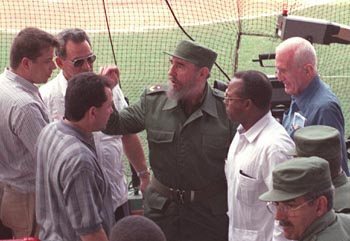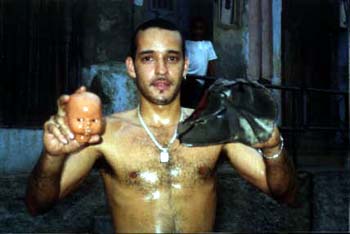![[Metroactive News&Issues]](/gifs/news468.gif)
[ Metro | Metroactive Central | Archives ]
Hollywood Meets Havana
Fidel enjoyed a relaxing day at the ballpark.
Why let politics get in the way of good entertainment?
By Dan Pulcrano
I know I should have been honored as hell last Monday when my host fished a boiled rooster claw out of the pressure cooker and dropped it onto my bowl of boiled potatoes, but honestly I almost jumped through the freakin' roof.
I was in Cuba to see friends and catch a baseball game and a concert. Watching the Baltimore Orioles' $81.4 million payroll sweat out their slim, 11th-inning victory over the scrappy Cubans made for a great game. And witnessing the most significant musical collaboration of U.S. and Cuban musicians in decades was illuminating, even if the show was, as The New York Times described it, "an artistic disaster."
The best stories, as always, could be found in the cheap seats and in the streets of places like Santiago de Cuba. Where else might I encounter lightly steamed poultry foot appetizers, or find teenagers playing stick ball with a doll's head?
Those moments were a galaxy apart from the equally surreal spectacle that unfolded inside the Karl Marx Theater and the Hotel Nacional, where journalists and cinematographers gathered to watch Don Was, Me'Shell Ndegeocello, Lisa Loeb, the Indigo Girls, Jimmy Buffett and others try to bridge the chasm between two nations separated by ninety miles of waves and jellyfish, and several decades of bad political craziness.
During the warm, lazy Havana evenings, the Americans sat amid palms and strolling musicians in their rock star clothes, drinking mojitos on the Nacional's garden patio. Some took cabs to the clubs frequented by tourists or to the homes of Havana's musical elite. Then they wrote songs, in collaboration with some of Cuba's most celebrated performers.
The result was a musical statement with all the depth of a tourist postcard. "Cuba Is Way Too Cool," sang Bonnie Raitt and Woody Harrelson in the insipid refrain of their bluesy number with Pablo Menendelez. Another songwriting team concocted a love paean to one of Cuba's leading tourist destinations, "My Old Havana," as if they had closed escrow on it during their week in the city.
The concert was organized by Musical Bridges, the Hollywood equivalent of the Berkeley hippie chicks with hemp handbags, long dresses and knitted caps who idealize Cuba, despite the preference of their Cuban contemporaries for perfume, Spandex and Celine Dion records.
The songs sounded way too much at times like "We Are The World." On whole, the show lacked the authenticity of Ry Cooder's Buena Vista Social Club musical collaboration, and Cuban music took a back seat to American pop. Not everything stank, though. Drummer Mick Fleetwood and saxman Gary Bartz allowed simple musicianship to speak. Unrecorded British folk singer Ruth Merry performed with fire and passion. Joan Osborne brought the crowd to its feet, though I am not sure why, since I was at the bar buying a beer.
Catch, anyone?
The baseball game earlier that same day was the better show, though the cerveza was inferior and poured from the spigot of a tanker truck into square cardboard cups. Though the game was "invitation only," my Cuban friends had managed to score a handful of invitations that had been passed out to patriotic workers and students in recognition of their support for the revolution, and which had a resale value of $1 to $5.
In the concrete seats of the nosebleed section overlooking right field, the view was excellent, the crowd impeccably behaved. "Because the tickets were passed out at work centers," my friend explained, "there are many communists here, not sports fans." Usually baseball tickets go for a Cuban peso, worth about a nickel.
That kind of commentary was missing down in the shaded section behind home plate, where major league baseball execs and journalists congregated, credentials and lenses bobbing on the fat bellies of their untucked Hawaiian shirts. Baltimore frat boys led their puny contingent in Orioles cheers as others clutched sweating Coca Colas and mini pizzas. "Have we proven that we're ugly Americans yet?" asked one Baltimorian. "Let's go meet Castro," another suggested before he was stopped by a security guard a few rows away from the legendary leader, who was smiling and chatting with important beisbolistas from the States.
As in the U.S., press coverage of major entertainment events is tightly controlled, and reporters are lazy. So despite the press throng and two landmark events in a single day, Americans received only a superficial portrait of the neighbor it knows the least about. Hearing "The Star Spangled Banner" played in Havana while more than 40,000 Cubans stood silently was indeed an epic moment. Nonetheless, the media illusion that somehow the two governments are warming to each other is basically a myth. Despite the excellent relations that Cubans and Americans enjoy in their informal interactions, there are no signs that the Cuban government is expanding personal or economic freedoms or that Washington is considering abandoning its cruel, counterproductive blockade of the economically-challenged island.
[ San Jose | Metroactive Central | Archives ]
![]()

Dan Pulcrano
Dan Pulcrano
From the April 8-14, 1999 issue of Metro.
Copyright © Metro Publishing Inc. Maintained by Boulevards New Media.